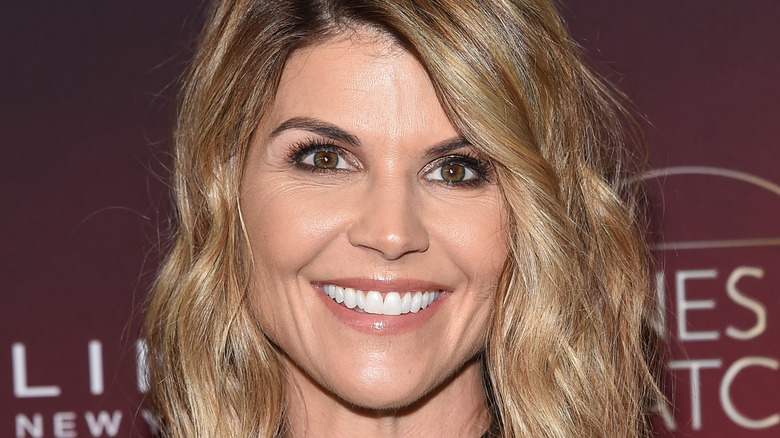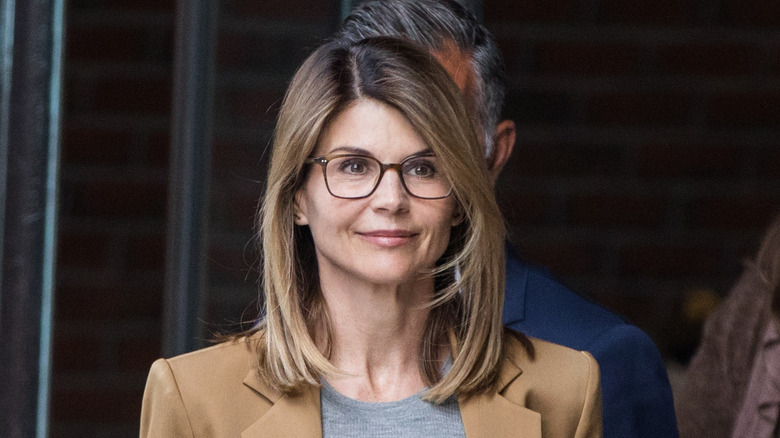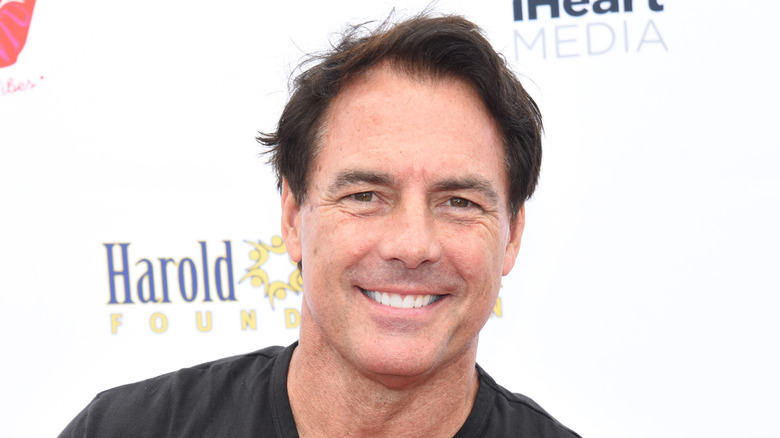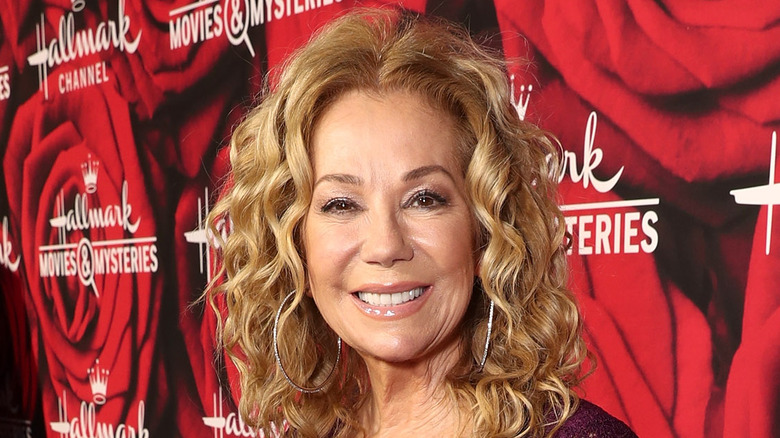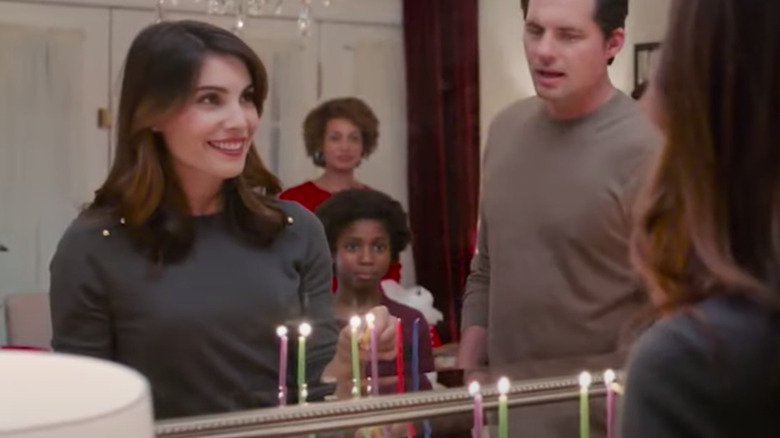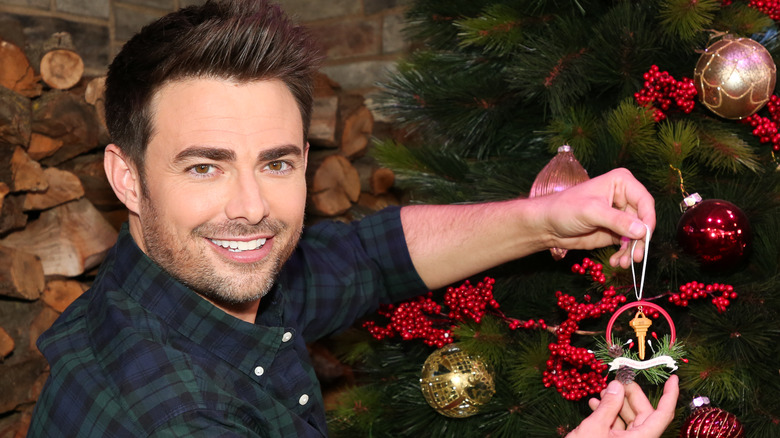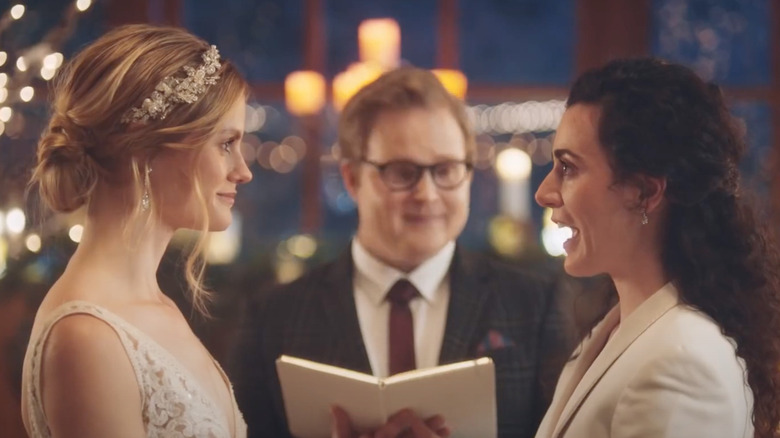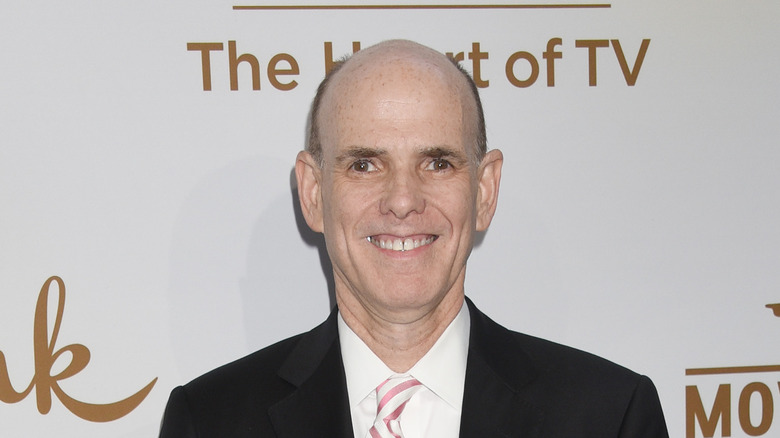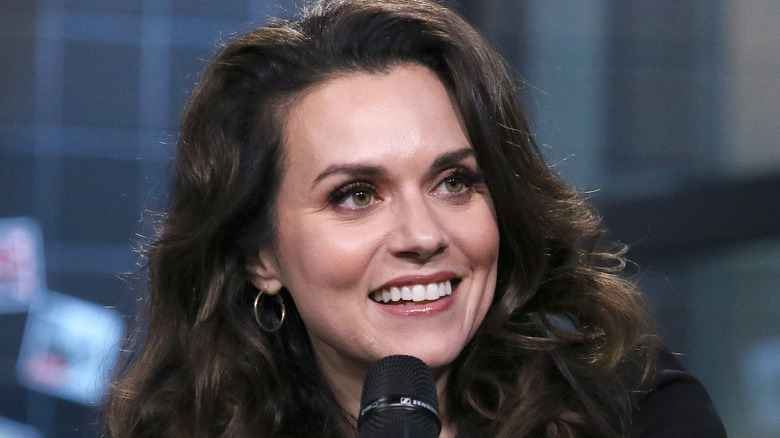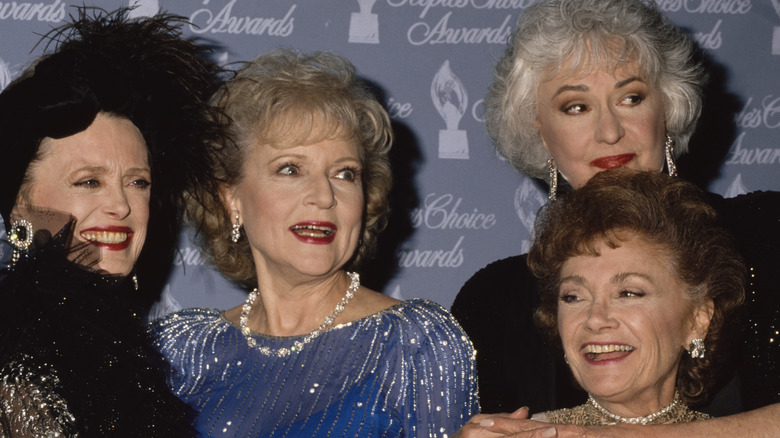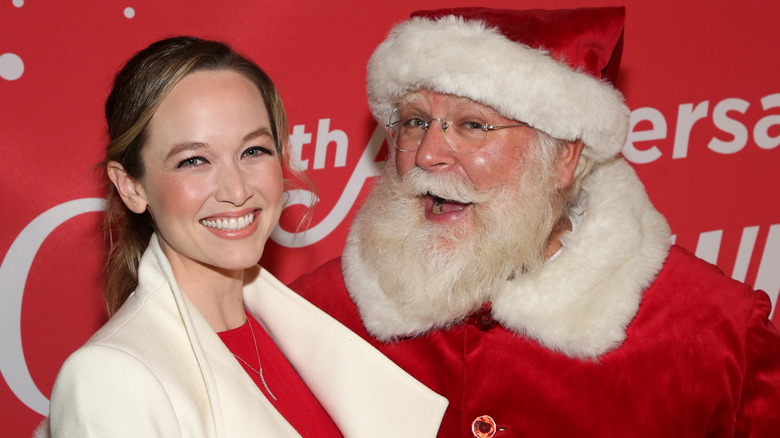The Shady Side Of The Hallmark Channel
When it comes to warmth, coziness, and nostalgia, no one does it like the Hallmark Channel. The TV network debuted on the airwaves under its patently snug name back in August 2001, hoping to play on consumers' knowledge of Hallmark greeting cards and the sentimentality they evoke. To say they had a hit on their hands is a bit of an understatement. In addition to syndicated hits, new series, and family-friendly films, the channel especially hits its stride around the holidays when it airs original films centered around staples like Valentine's Day, Thanksgiving, Mother's Day, and of course, Christmas.
In fact, Christmastime on network television practically belongs to the Hallmark Channel as they air over 30 original films each season and have created over 300 Christmas films, according to Forbes. They've got the viewership to back it up, too, and its streaming service Hallmark Movies Now hit 1 million subscribers back in 2020 (via Next TV).
Glory days, family values, and festive spirit — what could be so bad about that? Ironically, the channel has had its share of controversy, particularly involving its conservative and traditional programming and the head honchos behind it. The company has a history of keeping some things under the rug, so let's take a look at the shady side of the Hallmark Channel.
One of their biggest stars was at the heart of a huge scandal
Between "When Calls the Heart," the "Garage Sale Mysteries" movies, and numerous Christmas films throughout the years, Lori Loughlin was synonymous with the Hallmark Channel — until 2019, that is. In March, the "Fuller House" star was "charged with conspiracy to commit mail fraud and honest services fraud," per Entertainment Weekly, for her involvement in the college cheating scandal. Loughlin, and other A-list stars like Felicity Huffman, paid bribes to guarantee their children's admission to top universities. According to NPR, Loughlin and husband Mossimo Giannulli eventually pled guilty in August 2020. Lori was sentenced to two months in prison, "two years of supervised release ... a $150,000 fine and ... 100 hours of community service." That wasn't her only loss, though.
The Hallmark Channel reacted swiftly to the controversy, with parent company Crown Media Family Network issuing the following statement after the news broke: "We are no longer working with Lori Loughlin and have stopped development of all productions featuring Lori." As of this writing, they've stuck to their word.
Although Loughlin reprised her role of Abigail Stanton in 2021's "When Hope Calls" — based on Hallmark's "When Calls the Heart" — the series aired on GAC Family and not Hallmark, who bore down on their previous stance, telling Showbiz CheatSheet that year that "[we do not] have any plans to cast her in the future." Although they weren't responsible for her actions, it certainly wasn't the best look.
This Home & Family alum sued for wrongful termination
The world was shocked when Hallmark announced "Home & Family" co-host Mark Steines was leaving the show in May 2018, but as Deadline reported, his exit wasn't as simple as the channel made it out to be. In September of the same year, Steines sued the network for wrongful termination, alleging he was fired for standing behind two female staffers who reported executive producer Woody Fraser for sexual harassment. According to the suit, after Steines took his concerns to higher ups, "everything changed, with the network taking away his voice-over work, diminishing his role on the network, reducing his profile at industry events, cutting his salary by 25 percent, and ultimately firing him months before the end of his contract." Hallmark's parent company Crown Media responded in a statement that the decision was ratings based and there was "no merit to the legal claims [Steines asserted]."
Crown Media later tried to get the case thrown out but the motion was denied. In 2020, the case was dismissed after both parties settled out of court. But this wasn't the first time that "Home & Family" was sued for wrongful termination — 64-year-old Robert Levy alleged Fraser "harassed" and fired him due to his age in 2015, according to Patch — and it wouldn't be the last time either.
If you or anyone you know has been a victim of sexual assault, help is available. Visit the Rape, Abuse & Incest National Network website or contact RAINN's National Helpline at 1-800-656-HOPE (4673).
Shanti Hinojos also took the company to court
Following "Home and Family" co-host Mark Steines' lawsuit in 2018, celebrity chef Shanti Hinojos, who also appeared on the show, sued Hallmark parent company Crown Media and creator Woody Fraser for sexual harassment and wrongful termination, per Deadline. Hinojos, who's since gone on to appear on shows like "Selena + Chef," filed "an 11-claim complaint" alleging that she had been wrongfully terminated for "subpar job performance" after reporting Fraser for creating a hostile work environment.
According to Deadline, the suit included "detailed tales of inappropriate advances, touching, lewd comments by the EP ... and even an assertion of marriage to Hinojos if Fraser's wife died of cancer." Hinojos also alleged Hallmark knew of the situation but kept it under wraps. In response to the suit, Crown Media doubled down on their statement that "Hinojos was terminated for performance issues," adding they "investigated and there is no merit to her allegations," The Wrap reported.
As of this writing, it appears the suit has not been settled and is still pending. Regardless of the outcome, we're sure this wasn't the kind of press they were looking for.
If you or anyone you know has been a victim of sexual assault, help is available. Visit the Rape, Abuse & Incest National Network website or contact RAINN's National Helpline at 1-800-656-HOPE (4673).
The Hallmark Channel was accused of racism on set
The Hallmark Channel crafts the most picturesque and idyllic Christmas scenes, so it's no wonder people jump at the chance to walk amongst its festive setups as extras in Canada, where the network typically films their movies. In September 2018, however, Hallmark was under fire after Lesley Horat, who was an extra in "A Carousel Christmas" starring Kathie Lee Gifford, reported racism on set, according to Global News.
Horat told Global News that she was allowed in a crowd scene but a castling worker asked her and her scene partner to "sit it out" while filming a closeup of couples as "Hallmark has this policy against interracial couple representation" in productions. She, understandably, did not return to set the next day. "I felt like they ruined my space where I live because I don't have to deal with that on a daily basis," she told Global News. "Why even bother showing diversity if you're going to take it back to 1950s southern America?"
While a handful of insiders substantiated Horat's claims to Global News, Crown Media told the outlet that they did "not have a policy, stated or unstated, regarding interracial couples in [their] programming." The company also promised to further investigate the claims and better inform their crew of their diversity policies.
If you or a loved one has experienced a hate crime, contact the VictimConnect Hotline by phone at 1-855-4-VICTIM or by chat for more information or assistance in locating services to help. If you or a loved one are in immediate danger, call 911.
They've come under fire for representation
The Hallmark Channel has always touted its policy of family values when it comes to its programming, however its vague language came under fire in 2017 amidst wider conversations in the entertainment industry about diversity and inclusion. While the rest of the industry was catching up with #OscarsSoWhite, International Business Times noted that the Hallmark Channel had premiered a record 86 films between its various networks and "only six of those movies had non-white romantic leads." And on top of that, none of the films included Black or Asian romantic leads. The company's then-president and CEO Bill Abbott dodged blame for lack of diversity, telling the outlet it was "an industry-wide problem. Others have made a little more progress than we have made, granted, but at the same time ... we have a great track record of doing the right thing ...."
The network came under scrutiny again in 2019 when it released its first-ever Hanukkah films "Double Holiday" and "Holiday Date," which Deseret News summed up as movies about "a Jew [abandoning] Hanukkah and [embracing] Christmas ... the Jewish characters [are] merely ornaments." Rowan University religious studies professor Dianne Ashton even went as far as telling the outlet, "If this is an attempt at being inclusive it's a major failure."
To be fair, as of this writing, the Hallmark Channel has made waves in its representation. In 2021, it debuted the entirely Hanukkah-centered film "Eight Gifts of Hanukkah," and new president Wonya Lucas told Deadline that "probably 25 percent of [their] movies" that year "had diversity in them."
It look them a long time to include LGBTQ+ representation
Hallmark employs gay people; they have a line of LGBTQIA greeting cards, and even included a queer couple in an advertisement for their brick-and-mortar stores in 2016, but when it came to LGBTQ inclusion in their holiday films, the company certainly dragged its feet. After a noticeable lack of queer characters in its programming, the company was asked about the lack of inclusivity by Times Standard in 2017, and their reasoning at the time was less than sufficient. "There are no forced values associated with our networks with the exception that we want to provide a quality viewing experience for every member of the family," former senior vice president of publicity Pam Slay told the outlet, adding, "We are not an issues-oriented network: our goal is for every viewer who comes to us to feel happier and better because they watched."
The answer sounded like a roundabout way of the network refusing to be inclusive of queer stories, especially considering they already had a longstanding history of recruiting LGBTQ actors to play straight characters. Fast-forward and the network has certainly changed its ways. In 2020, they premiered "The Christmas House," starring real-life husbands Jonathan Bennett and Brad Harder, which marked the first openly gay couple in a Hallmark film.
It was a landmark moment for representation, for sure, but there was one more scandal that had to happen before Hallmark took the plunge.
They knocked a gay commercial off the air
Hallmark was forced to seriously reevaluate its brand in December 2019 after Zola, a wedding planning website, removed its advertisements from the channel after the station "removed four commercials that featured two brides kissing each other," per CNBC. The network made the decision after right-leaning organization One Million Moms launched a boycott against the station for airing the ads in the first place, as the group felt queer inclusion was not "moral."
After that initial decision, a lot of things happened at once. Hallmark purported that it pulled the ad because the "public display of affection violated its policies," per CNBC, although Zola commercials featuring heterosexual couples kissing were left on air. In response to what appeared to be a homophobic and hypocritical decision, #BoycottHallmark went viral. Hallmark quickly reversed the decision and released a statement on Twitter admitting that it was the "wrong" call and the company would be "working with GLAAD to better represent the LGBTQ community across [their] portfolio" as well as "reaching out to Zola to ... reinstate the commercials."
The changes went higher up the ladder, as well. In January 2020, longtime president and CEO Bill Abbott left the company and was replaced by Wonya Lucas, who would later tout new diversity benchmarks in a 2021 press tour. "We are really seeking to make sure that everyone can see themselves in our movies," Lucas said.
One of their execs left to create competition
Former CEO and president Bill Abbott left the Hallmark Channel in January 2020 after controversy surrounding its handling of a queer wedding commercial — only to take a position running its competition: television brand Great American Country. According to Bloomberg, Abbott was tapped to run the network after Hicks Equity Partners, "a firm with links to the Republican National Committee and the Trumps" acquired GAC from Discovery Inc. for a cool $90 million.
The channel rebranded to GAC Family, rather than its former focus as a country music network, and they quickly got into the original Christmas movie business. While the company has not come out against queer storytelling, its website boasts that its mission is "to celebrate great American traditions and invest in timeless, family-friendly entertainment that honors Americana" and its 2021 holiday film lineup was noticeably devoid of any LGBTQ romantic leads.
Although some familiar Hallmark Channel faces have already made an appearance in GAC Family films, they're watching the new company's politics closely. Actor Paul Campbell, who's starred in Hallmark flicks like "A Godwink Christmas" and "Holiday Hearts," wrote on Twitter that he "will be keeping a close eye on the GAC content rollout" and "if there's a noticeable lack of meaningful inclusion," then he "will not be working for [them.]"
The Hallmark Channel can be tough to work with
"One Tree Hill" actor Hilarie Burton was a bright spot in Hallmark's "Naughty or Nice" in 2012, playing Krissy Kringle, a marketing exec who finds herself in possession of Santa's naughty or nice list. She went on to star in a handful of other projects at the network including "Surprised by Love," but their working relationship seemed to dissolve after 2016's "Summer Villa." As it turns out, Burton, who has found a home in Lifetime's slate of holiday films, had a pretty good reason for bowing out.
In the wake of the Zola commercial controversy, Burton took to Twitter in December 2019 to reveal she had been "let go" from a Hallmark project after asking for "a LGBTQ character, an interracial couple and diverse casting." The big wigs at Hallmark reportedly ignored all her requests and told her to "take it or leave it" — and so she walked. "Sh***y being penalized for standing up for inclusivity," she wrote. "I really wanted that job. It was close to my house. It paid really well. It was about the military, which you all know I hold dear."
Still, the actor asserted she would "walk away again in a heartbeat," adding, "The bigotry comes from the top and permeates the whole deal over there." In response to her complaints, Hallmark told NBC News that Burton "worked on projects with us under contract" and "not as an employee of its parent company."
Their censorship has come under fire
Hallmark aims to entertain and not offend, though the lengths it takes to guarantee that its content does not alienate families has garnered a fair share of criticism. While its original programming fits its protocols to a T, the channel also airs a handful of syndicated sitcom classics like "Golden Girls, "Reba," and "Frasier" which don't always live up to the network's squeaky clean standards.
In 2011, defunct news site theSOP pointed out that the channel was censoring words like "a**" and "hooker" during reruns of "Frasier" and "Golden Girls," even though the shows' original dialogue had been allowed on television. The network told theSOP that the censorship occurred because its "Standard & Practices [policies] are very conservative" and "There are words and phrases commonly used on other cable channels ... that [the network] deem unacceptable." Considering both sitcoms were known — and beloved — for their characters' often promiscuous conversations, it seemed a bit like overkill.
The network's Standards & Practices department got the channel in hot water again in 2014 when they "[muted] the word 'God'" while showing 1994 film "It Could Happen to You," per Inquisitr. The censorship was misread by viewers as a way of removing God from its content and the network was forced to issue a statement that they muted the word to "[stay] on the side of caution to not offend, as our Standards & Practices department categorized it as God was being used in vain" (via Christian Today).
Critics have argued that they over-glamorize the holidays
For the most part, you know what you're expecting when you pop on a Hallmark Christmas film: warm fireside chats, a slightly overbearing if not entirely loveable family, and a homespun romance that affirms love in a small town is better than whatever awaits in the city. The network knows what its audience is looking for, but that doesn't mean their go-to tropes aren't entirely problematic.
As The Signal pointed out in 2020, while "no one actually believes in the lessons from Hallmark movies," many of their themes "represent darker aspects of our culture." Although Christmas has become a commercial holiday, she noted that Hallmark films "appear to be against the rise of industrialization" as its storylines often revolve around homecoming and are "resistant to accepting other forms of a lifestyle." The central themes of their films "also seem to discourage women from entering the workforce," with many key storylines revolving around female characters giving up big jobs to stay in their "hometown where everyone knows each other" and raise a family.
It should also go without saying that the channel's depiction of the holidays that are completely unrealistic. The decadent trees, perfect cookie platters, and romantic get-togethers set a standard no one can live up to, and as the outlet wrote, "the holidays are stressful enough." Perhaps the best we can do is take Hallmark's programming face value for what it is: entertainment.

